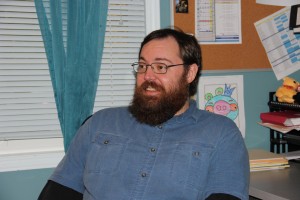
Andrew Gobin/Tulalip News
By Andrew Gobin, Tulalip News
TULALIP − “It’s about language and perspective. How issues are talked about. How issues are presented and received,” said Ryan Akin, one of the new additions to the child and family therapy team at beda?chelh. As he transitions into his position in the Tulalip community, Akin discusses his views on mental wellness and what it takes to get there.
“I’d like to explain a little bit about what I do,” he began. “I am a counselor, not a therapist. Therapy in practice works to identify a problem and help people fix that problem. Counseling moves away from the very sanitized and sterile practice of therapy, focusing on people. Everyone here is an individual. We respond to the person, not the issue.”
Grief counseling is one aspect of his job, and in an effort to understand the people he is working with, he was encouraged to attend a funeral service for a tribal member to experience the grief of the family and the community. He offered grief counseling to kids for a week following the funeral.
“This is so different than the institutionalized idea of people. Rather than learning about them and their needs, I live with them and experience who they are in order to understand their needs,” Akin explained.
The Tulalip community is unique, as are most tribes. They have a history of generational trauma intertwined with tradition and cultural revitalization.
“Understanding generational trauma is integral in helping people to wellness. You have to know that each piece that shapes behavior potentially stems from these traumas. It’s the difference between ‘and’ and ‘but’. I’m trying to be ok but I have this trauma, versus, I have this trauma and I will be ok.”
Ultimately, Akin’s goal is to help remove the generational trauma Tulalip people, and all Indian people, have been steeped in. Healing the community now will prevent the coming generations from experiencing these same traumas.
“We focus on the small steps towards healing, not the five to ten years it takes to get there. This is not a doctor’s office. There is no checklist or agenda. It is based on the person.
“For Indian people, the road to wellness is more like a filter. Holding on to what was, bringing that forward to what is now, and looking to what will come next, while continuing to bring the past forward,” he concluded.
Akin acknowledges the team of counselors he has joined. It is their joint work to promote mental wellness and work towards building a strong connection with the community in order to create a comfortable and safe environment for everyone.
“I want people to understand what we do here. I want anyone to be able to come and talk about things that we can help them with,” he said.
For more information contact Ryan Akin at rakin@tulaliptribes-nsn.gov, or by phone at (360) 716-3284.
Andrew Gobin: 360-716-4188; agobin@tulaliptribes-nsn.gov
